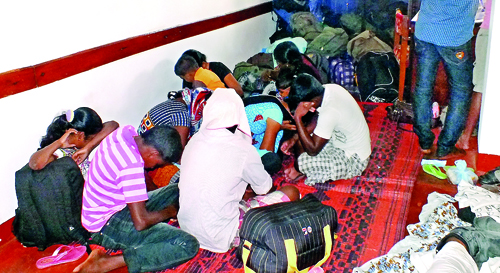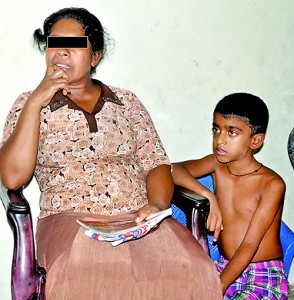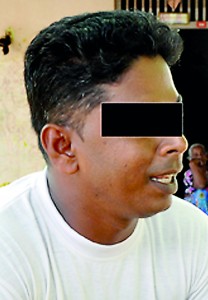News
Come hell or high water, they find new ways to go
Extensive campaigning and tightened surveillance by law enforcement authorities have succeeded in reducing the number of Sri Lankans attempting to enter Australia illegally by boat.
However, new trends in human smuggling are emerging as some smugglers have started operating from other countries such as Indonesia and Malaysia.

File pic of arrested would-be boat people
Since the authorities started cracking down on the smugglers, 225 have been arrested, including eight human smuggling kingpins who were operating in Sri Lanka.
A hope for a better life, as vividly portrayed by the racketeers to unsuspecting civilians, mostly in the North and the East has drawn hundreds to take the dangerous journey. From 2012 to date, 4,100 people have been arrested while attempting to go to Australia, according to police statistics.
Saman* from Iranawila in Chilaw was with 87 others who attempted the risky journey in 2011. He got to know about a boat leaving for Australia from his area through his friends and was keen to join. He also knew the skipper (coxswain) of the boat and contacted him for more details. His seafaring skills were to his advantage and he was recruited.
After receiving instructions from the skipper of the boat to come to the beach close to Thoduwawa Cemetery in Negombo, Saman left home with Rs. 200,000 in hand to pay the smuggler. The deal was swift. The smuggler equipped with a money-counting machine,

Waiting for news of a loved one who took the risky jouney. Pix by Ranjith Perera
checked if the right amount was there and told him to get into one of the smaller boats to take him to a multiday boat. Others from the North and East who were to travel were already in the main boat. A van and a bus which transported the passengers from the North and the East were parked on the beach.
“People came, gave the money and got into boats and off they went,” Saman said.
A calm sea enabled them to reach Australia in 14 days, but all 87 people were arrested by the Australian Navy. Two and half weeks later they were deported to Sri Lanka. Saman spent four months in a local jail before a Rs. 100,000 monetary bail and Rs. 2000,000 surety bail set him free. Saman now has the added burden of paying off debts incurred to pay the smuggler and the bail money.
People smugglers often recruited the coxswains from Saman’s community or from the Abagahawila area as they were known for their navigation skills in the sea. People like Saman were recruited to work as crew members of the boat and were either charged a discounted rate or not charged at all.
Some others in the area were more fortunate than Saman. Sriyani’s* elder son also embarked on a similar journey. The young carpenter had made an impulsive decision and abandoned his work midday to get on a boat to Australia.
“He was building a roof not far away. He came home suddenly and said he was going to town,” Sriyani said. His parents heard from him only three weeks later.
“We thought he was dead” said Sriyani who later learnt that her son’s boat went off course before it reached Australia.
Sriyani has no knowledge of her son’s whereabouts and waits for him to call every day. With her husband sick, and another two children to look after, Sriyani says she depends on her elder son’s money for survival.

One who never made it
According to Police, when smugglers buy the boats from the owners, they also recruit the crew. A skipper is usually paid about Rs. 1000,000. However, in cases where arrests were made in the south, the situation was different. Police rarely found a direct link to any smuggling racket. Investigations revealed that most were stand-alone cases where groups of people with experience in seafaring planned their journeys to Australia.
Investigations have also revealed that Muhundan, a kingpin in a people smuggiling racket in Sri Lanka, operated a vast network of ‘sub agents’. The network now mostly defunct following Muhundan’s arrest was used to recruit people for the journey.
According to the Police, Muhundan was arrested in 2010 when he attempted to smuggle people by sea for the first time. Without adequate laws to prosecute him, Muhundan was released on bail. With plans to continue the smuggling racket, he recruited the people who were in his boat as ‘sub agents’.
Following his release, Muhundan also helped the Sri Lankan Police to organise a safe-migration campaign in collaboration with the Australian Federal Police. He would then approach the same people who took part in the seminars to recruit people for the journey. According to the police, he lured people in by saying that he had connections with the Australian Federal Police. This gained credibility as he was seen with Australian Police at the seminars the would-be migrants took part in.
In contrast, another smuggler, Chandrasekar, earned the trust of the people by having a solid return policy. If the passenger does not safely reach Australia the money the passenger paid would be paid back. In return he wanted their silence. According to the Police, till he was arrested he returned the money paid by returnees if they did not reach the final destination.
People were promised passage to Australia for about Rs. 800,000, of which up to Rs. 200,000 had to be paid before embarking on the journey, while the rest should be paid to an agent in Sri Lanka by a family member once the boat carrying the passengers cleared Sri Lankan waters. This racket has now been largely broken due to the crackdown.
However, new trends are emerging, say the police who are investigating rackets where smugglers lure the hopeful migrants stating that the boat journey will start from outside of Sri Lanka. The people recruited are told they would be sent to countries such as Malaysia or Indonesia from where they would embark on a boat journey.
“Often, they are told that they would go to Indonesian islands to get into a boat,” said Inspector Hewawadu, Officer in Charge of the Human Smuggling unit of the Criminal Investigations Division (CID). While authorities could not find any outside link to the smugglers operating in the country, they suspect a strong diaspora connection. Each time a boat is detected, a lawyer appears to represent the Tamil people arrested. However none of the Sinhala people is represented by this lawyer. This, the police say, indicates a link with an outside connection.
The recent detection of another Australia-bound boat indicated there was no reduction in people sumuggling. Questioning by the police revealed that Sri Lankans who have already reached Australia had told would be irregular migrants that they would not be taken to Papua New Guinea.
“The people have been told that it was a lie and the Sri Lankans in Australia can help the migrants if they reach Australia,” IP Hewawaduge said.
* Not their real names
| Toughest ever border protection measures by Australia
The Australian Customs and Boarder Protection unit attributes the reduction in human smuggling to the ‘toughest border protection measures called Operation Sovereign Borders (OSB)’, under which none of the irregular migrants reaching Australia will be settled in the country. Under the OSB, Australia has signed agreements with Papua New Guinea and Nauru to settle any irregular migrant identified as a refugee. Migrants who have no genuine claim to say they are refugees will be returned to their countries of origin, said a spokesperson. However the spokesperson was not clear about how many irregular migrants have reached Australia in the past. The email communication only stated that 79 persons from the last boat that arrived in Australia from Sri Lanka ‘were promptly returned to Sri Lanka, with the support of the Australian government’. According to the spokesperson, since the beginning of OSB in September last year to May 2 this year, 34 Sri Lankans have been voluntarily removed and 134 more involuntary removed from mainland Australia. In addition, two more Sri Lankans have voluntarily returned from an offshore processing centre (OPC) with the assistance of the International Organisation for Migration (IOM). The spokesperson did not wish to comment on new trends observed stating that doing so will give an advantage to people smugglers. |

